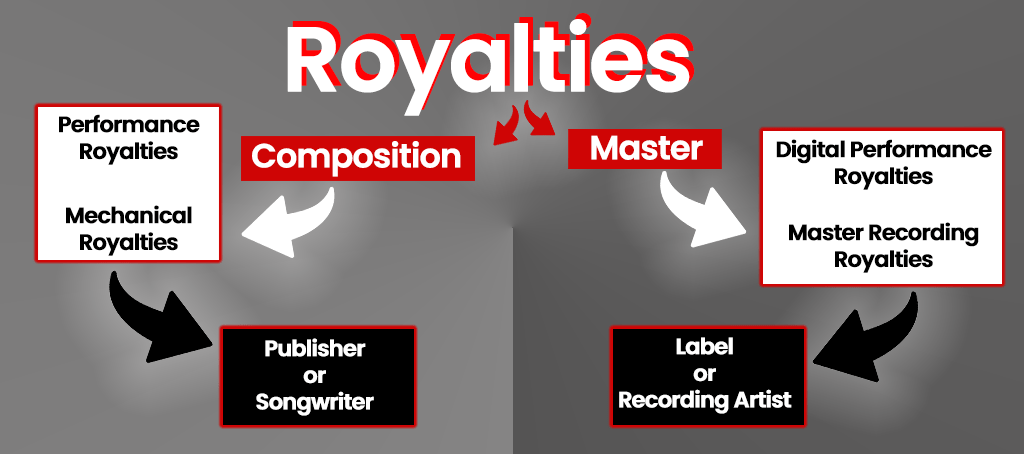
Music Royalties
Royalties are a means to pay someone for the right to use their intellectual property or work. There are multiple different types of royalties for music assets and many complexities, with laws and payouts varying from country to country. For independent artists, it can be incredibly challenging to navigate all of this and receive the proper compensation for their work. We help our partners collect all of these varying revenue sources and take care of the administrative side.
With music, there are two distinct copyrights to be aware of;
Underlying musical work (often referred to as the composition)
Sound recording / master recording

Publishing Royalties
Paid out to the associated songwriters/composers of musical work/composition. There are multiple different types of publishing royalties generated in association with the composition.
A key distinction to understand – if you have covered someone else’s song, then the original composers/songwriters of the work you have covered are eligible to collect publishing royalties on your sound recording. Depending on your location, you may also need a license to legally release your cover song.
Our publishing division helps our partners collect all of their digital royalties through our direct partnerships with various overseas and local societies, along with cleaning up data issues that result in songwriters not being paid properly.
Master Recording Royalties
Paid out to the record label/distributor or owner of the master recording, generated by digital streaming/downloads or physical sales.
Neighboring/related rights royalties
Paid out by organizations such as Recorded Music in New Zealand, and SoundExchange in the United States – generally from public performance, broadcast, communication and reproduction rights in sound recordings and most commonly generated from radio plays.
When it comes to YouTube, the main pay sources are master recording royalties, synchronization, performance and mechanical royalties.
Performance Royalties
Performance royalties are a form of royalty that’s non-interactive, and these are usually paid out to the recording artist from digital streaming platforms/services or for physical use such as in shops or music venues.
- Performance Royalties are paid to the relevant PRO (Performing Rights Organization) in each respective territory. APRA collects performance royalties primarily for writers based in Australia and New Zealand, and has partnerships with overseas societies to pass on overseas income to their local members. There are multiple PROs in the United States for example, such as BMI, ASCAP & SESAC. These organizations only collect & pay performance royalties and do not collect mechanical royalties. Australia and New Zealand is unique, as APRA AMCOS in Australia and New Zealand can license/collect both mechanical and performance royalties if members choose to opt into AMCOS. APRA AMCOS grants licenses for the live performance, broadcast, communication, public playing or reproduction of its members’ musical works. If you are a locally based songwriter or artist, we highly encourage you to learn more and sign up for free with APRA and register your works.
- Payout rates can differ from country to country, depending on the copyright law for that respective territory.
- The amount paid out for performance royalties in the digital world is substantially lower than what is paid out for mechanical royalties, which usually go uncollected unless you have a publisher or publishing administrator, like Precise. As a music publisher, Precise can help you collect all of these royalties.
Mechanical Royalties
Mechanical royalties are generated through the reproduction of copyrighted works in digital and physical formats. Songwriters are paid mechanical royalties per song sold, downloaded, and streamed via “on-demand” streaming services.
The mechanical royalty rate in the United States is regulated via the Copyright Royalty Board (CRB) through a panel of three judges. This rate is set to increase by over 44% over the next few years
- Mechanical royalties are collected by different societies across the world. In the United States, mechanical royalties are collected and paid out by the Mechanical Licensing Collective (MLC) – this includes royalties on YouTube art tracks/YouTube Music uploads.
- AMCOS (which is apart of APRA AMCOS) collects mechanical royalties in Australia & New Zealand and has partnerships to collect from overseas societies for members who have opted into AMCOS.
- The current statutory mechanical royalty rate for physical recordings (such as CDs) and fixed digital downloads is 9.1¢ for recordings of a song 5 minutes or less, and 1.75¢ per minute or fraction thereof for those over 5 minutes in the United States.
Synchronization Royalties
YouTube pays out a micro-sync royalty in the United States, which is only able to be collected by select music publishers who have a direct publishing agreement with YouTube. This synchronization royalty, which commonly goes uncollected, is paid out on music video and sound recording assets – or for videos which are picked up automatically by YouTube’s Content ID system and monetised with a composition or sound recording claim.
Neighboring Rights/Related Rights Royalties
The term ‘neighboring rights’ is used in some countries to refer to the public performance, broadcast, communication and reproduction rights in sound recordings. These are eligible to be paid out to the owners of the master recordings such as a record label – or if you are an independent artist, you can receive these directly.
The royalties collected by neighboring rights societies include;
- Public performance via OneMusic (the license fee is distributed between Recorded Music for master recording rights holders and APRA AMCOS for the composers/writers of the song). This covers royalties from use of music in shops, businesses and venues who are legally required to obtain a blanket license to play music in a public setting.
- Broadcast licenses with TV and radio
- Communication licenses with digital services (such as free to air TV catch up, commercial radio simulcasts or other online radio services such as Pandora or SiriusXM)
In New Zealand, Recorded Music collects these royalties and pays it to their artist or label members. Similarly with APRA, Recorded Music also has partnerships with PPCA and SoundExchange to collect royalties for uses of their members’ recordings in Australia and the United States.
We encourage you to learn more about neighboring rights via your local neighboring rights society;
Recorded Music (New Zealand) PPCA (Australia) SoundExchange (United States)
